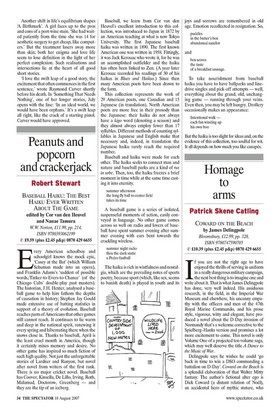Peanuts and popcorn and crackerjack
Robert Stewart BASEBALL HAIKU: THE BEST HAIKU EVER WRITTEN ABOUT THE GAME edited by Cor van den Heuvel and Nanae Tamura WW Norton, £11.99, pp. 214, ISBN 9780393062199 © £9.59 (plus £2.45 p&p) 0870 429 6655 Every American schoolboy and schoolgirl knows the mock epic, 'Casey at the Bat' (which William Schuman made into an opera), and Franklin Adams's 'saddest of possible words,/Tinker-to-Evers-to-Chance' (of the Chicago Cubs' double-play past masters). The historian, J. H. Hexter, analysed a baseball game to help him fathom the depths of causation in history; Stephen Jay Gould made extensive use of batting statistics in support of a theory of evolution. Baseball reaches parts of Americans that other games still cannot reach. It continues to lie warm and deep in the national spirit, renewing it every spring and hibernating there when the snows close in. Thanks to baseball, April is the least cruel month in America, though it certainly mixes memory and desire. No other game has inspired so much fiction of such high quality. Not just the unforgettable stories of Lardner and Runyon, but novel after novel from writers of the first rank. There is no major cricket novel. Baseball has Coover, Kinsella, De Lillo, Irving, Roth, Malamud, Doctorow, Greenberg — and they are the tip of an iceberg.
Baseball, we learn from Cor van den Heuvel's excellent introduction to this collection, was introduced to Japan in 1872 by an American teaching at what is now Tokyo University. The first Japanese baseball haiku was written in 1890. The first known American one was written in 1958. Fittingly, it was Jack Kerouac who wrote it, for he was an accomplished outfielder and the haiku has often been linked to Zen. (A year later Kerouac recorded his readings of 30 of his haikus in Blues and Haikus.) Since then many American poets have been drawn to the form.
This collection represents the work of 29 American poets, one Canadian and 15 Japanese (in translation). North American poets are more free in their prosody than the Japanese: their haiku do not always have a kigo word (denoting a season) and they almost always employ fewer than 17 syllables. Different methods of counting syllables in Japanese and English make that necessary and, indeed, in translation the Japanese haiku rarely reach the required number.
Baseball and haiku were made for each other. The haiku seeks to connect man and nature and baseball parks are a kind of tus in urbe. Then, too, the haiku freezes a brief moment in time while at the same time casting it into eternity.
summer afternoon the long fly ball to center field takes its time A baseball game is a series of isolated, suspenseful moments of action, easily conveyed in language. No other game comes across so well on radio and lovers of baseball have spent summer evening after summer evening with ears bent towards the crackling wireless.
summer night radio thru the dark static a Pedro fastball The haiku is rich in wistfulness and nostalgia, which are the prevailing notes of sports poetry, because sport (which, like sex, seems to banish death) is played in youth and its joys and sorrows are remembered in old age. Emotion recollected in resignation. So, puddles in the batter's box abandoned sandlot and box scores the taste of a breakfast sausage.
To take nourishment from baseball haiku you have to have ballparks and linedrive singles and pick-off attempts — well, everything about the grand, old, unchanging game — running through your veins. Even then, you may be left hungry. Drollery occasionally makes an appearance: Intentional walk — each fan winding up his own boo But the haiku is too slight for ideas and, on the evidence of this collection, too soulful for wit. It all depends on how much you like canapes.












































 Previous page
Previous page